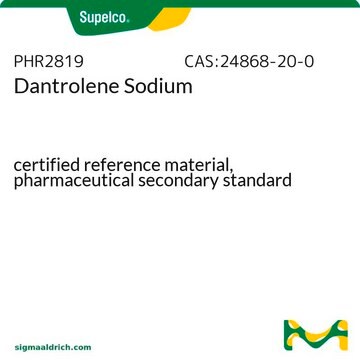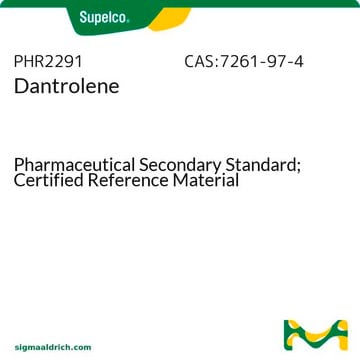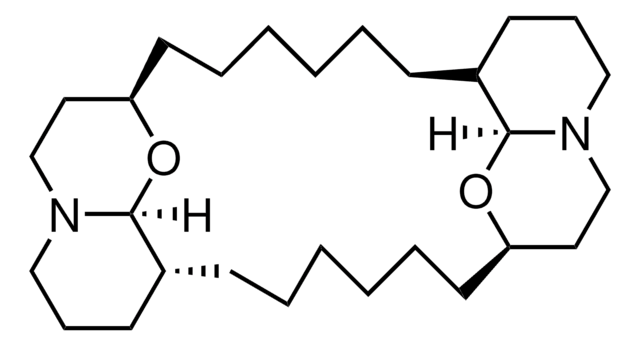251680
Dantrolene, Sodium Salt
A cell-permeable blocker of intracellular calcium release from the sarcoplasmic reticulum that acts by binding to the ryanodine receptor.
Synonym(s):
Dantrolene, Sodium Salt
About This Item
Recommended Products
Quality Level
Assay
≥95% (HPLC)
form
solid
manufacturer/tradename
Calbiochem®
storage condition
OK to freeze
desiccated (hygroscopic)
color
orange
solubility
DMSO: 3 mg/mL
aqueous base: soluble
shipped in
ambient
storage temp.
10-30°C
SMILES string
[Na]N1C(=O)N(CC1=O)\N=C\c2[o]c(cc2)c3ccc(cc3)[N+](=O)[O-]
InChI
1S/C14H10N4O5.Na/c19-13-8-17(14(20)16-13)15-7-11-5-6-12(23-11)9-1-3-10(4-2-9)18(21)22;/h1-7H,8H2,(H,16,19,20);/q;+1/p-1/b15-7+;
InChI key
KSRLIXGNPXAZHD-HAZZGOGXSA-M
General description
Biochem/physiol Actions
Ryanodine receptor
Warning
Reconstitution
Other Notes
O’Mara, S.M., et al. 1995. Neuroscience68, 621.
Parness, J., and Palnitkar, S.S. 1995. J. Biol. Chem.270, 18465.
Zhang, H., et al. 1995. Am. J. Physiol. 269, H1874.
Hotchkiss, R.S., and Karl, I.E. 1994. Proc. Natl. Acad. Sci. USA91, 3039.
Song, S.K., et al. 1994. Proc. Natl. Acad. Sci. USA91, 3039.
Legal Information
Storage Class Code
11 - Combustible Solids
WGK
WGK 2
Flash Point(F)
Not applicable
Flash Point(C)
Not applicable
Certificates of Analysis (COA)
Search for Certificates of Analysis (COA) by entering the products Lot/Batch Number. Lot and Batch Numbers can be found on a product’s label following the words ‘Lot’ or ‘Batch’.
Already Own This Product?
Find documentation for the products that you have recently purchased in the Document Library.
Our team of scientists has experience in all areas of research including Life Science, Material Science, Chemical Synthesis, Chromatography, Analytical and many others.
Contact Technical Service






